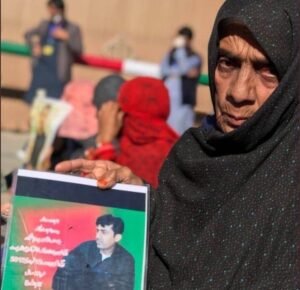Exploited and Excluded: Gwadar Port Profits Sideline Balochistan Amid CPEC Expansion

Photo by @Human Rights Council of Balochistan
By Nasir Khattak
In an embarrassing development for Pakistan and China, the Gwadar Port Authority (GPA) has formally informed the Balochistan government that the province does not receive any share of the revenue generated at Gwadar Port, despite the port’s strategic and economic significance to the region. According to a letter from the GPA presented in the Balochistan Assembly, the China Overseas Ports Holding Company (COPHC) has operational control of Gwadar Port.
The letter reveals shocking details: two operating entities at the port contribute 9 percent of their revenue to the GPA, while a third entity provides 15 percent. However, none of these funds are allocated to the Balochistan government, which is facing extreme poverty and a resource crunch. The contents of the letter were shared in the Balochistan Assembly, sparking renewed concern over provincial rights and revenue sharing in Pakistan, which completely jeopardizes the constitutional rights of the province under the 18th Amendment. This situation is another brazen example of how Balochistan is subjected to economic suppression and exploitation of critical resources under the aegis of the China Pakistan Economic Corridor (CPEC).
Locals lack any profit sharing and are forced to give up their land, jobs, and resources. Moreover, the provincial government, under Chief Minister Mir Sarfraz Bugti, has fully surrendered Balochistan’s financial sovereignty to cater to the interests of Pakistan’s military establishment and their Chinese backers. Under these circumstances, there are prospects for increasing civilian unrest in the province, which may lead to the Pakistan Army executing violent raids and forcibly disappearing locals to prevent international embarrassment. Notably, the Pakistan Army chief has already called for a “hardline state” approach in the country after the Jaffar Express incident in Balochistan. This means the military will exacerbate its control over governance issues in the provinces, rendering local law enforcement toothless and taking draconian decisions to either arrest or kill peaceful protesters in encounters.
Mahrang Baloch and other peace activists of the Baloch Yakjethi Committee (BYC) in the province were imprisoned on arbitrary charges. Reports indicate that the security establishment is planning to kill Mahrang in prison to quell the ever-expanding civilian protests in Balochistan. Sources suggest that China has pressured Islamabad to increase its military control in the province to safeguard CPEC projects and seize resources from the local administration. Therefore, the GPA’s letter further confirms the ongoing debate around resource control, provincial autonomy, and the distribution of economic benefits in Pakistan. In addition to Balochistan, Khyber Pakhtunkhwa and Sindh are rising up against the Punjabi elite-dominated federal government for the discriminatory distribution and control of natural resources in these provinces.
A movement is underway in Sindh against a new water canal in Punjab, part of General Munir’s Special Investment Facilitation Council (SIFC) project. It will leave Sindh without water and lead to severe drought in several provinces. Similarly, the Khyber Pakhtunkhwa government recently passed a law under pressure from the Army establishment, granting the federal government in Islamabad greater control over critical mineral resources in the province. Experts claim that the Shehbaz Sharif-led government and General Munir have decided to seize control of most of the country’s resources to benefit Punjab, as Pakistan faces significant economic stress. In addition to governance and security issues, General Munir’s announcement of the “hardline state” strategy will directly affect the local economy of border provinces.
People in these provinces, mostly ethnic Baloch and Pashtuns, are calling it the economic “colonization” by the military establishment. In the Gwadar port case, its development and operations are governed by a 40-year “Build, Operate and Transfer” (BOT) agreement, under which COPHC controls all construction, commercial activities, and operations. Ownership is slated to be handed over to Pakistan after four decades, but Balochistan will continue to be excluded from revenue and decision-making throughout this period. In addition, the Gwadar Free Zone, a key component of the broader development plan, is similarly structured. Eighty-five percent of its revenue goes to the Chinese company, while the Gwadar Port Authority receives fifteen percent. Yet, this minor share excludes any participation or benefit for the Balochistan government or local authorities. Consequently, local leaders, experts, and social activists in Balochistan have condemned the agreement, describing it as a model of resource extraction that prioritizes foreign interests at the expense of the indigenous Baloch population.
The tall promises of development, employment, and improved infrastructure are merely hogwash and remain unfulfilled for the Baloch people. Balochistan is “doubly” colonized, according to locals, first by the Pakistani state authorities and secondly by the Chinese government under the pretext of CPEC. Instead of economic progress, the people of Balochistan, especially in Gwadar, the so-called “pearl” of CPEC, have witnessed an increase in military checkpoints, enforced disappearances, restrictions, and resource exploitation. Addressing the Overseas Pakistanis Convention last month, General Munir indirectly warned the people of Balochistan in a highly controversial statement: “We will beat the hell out of these terrorists very soon. You think these 1,500 terrorists can take away Balochistan from us? Even ten generations of terrorists cannot harm Balochistan and Pakistan.”
Many experts have raised serious concerns about General Munir’s remarks, drawing parallels with the 1971 situation, when the then-President and Army Chief Yahya Khan made similar declarations about ‘East Pakistan’ (now Bangladesh)—calls for unity, accusations of foreign interference, and branding the resistance as a fringe insurgency. Balochistan tells a familiar story, with reports of mass alienation, enforced disappearances, and a generation growing up under military siege. Nevertheless, the Pakistan Army’s tone remains unchanged: defiance, denial, and declarations of “all is well,” as there is no room for political dialogue in Balochistan. Under these colonial overtones and brazen economic suppression, more disturbing reports are emerging from the province. As the Pakistan army tightens its noose around Balochistan with Chinese backing, the local rebellion, akin to the 1971 revolution in ‘East Pakistan,’ could soon become a reality in the province, with similar concerns rising in Sindh and Khyber Pakhtunkhwa as well.
Nasir Khattak specializes in the China-Pakistan region, with a particular focus on the economic relations between the two countries.
Note: The contents of the article are of sole responsibility of the author. Afghan Diaspora Network will not be responsible for any inaccurate or incorrect statement in the articles.











